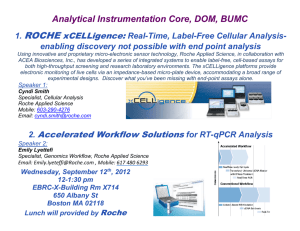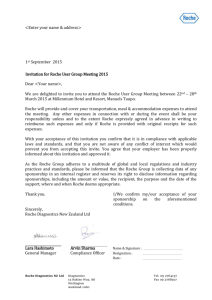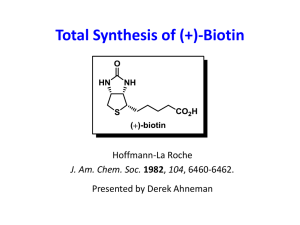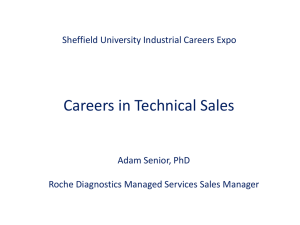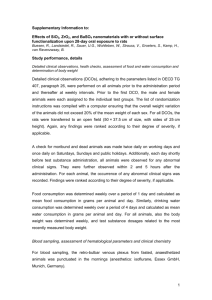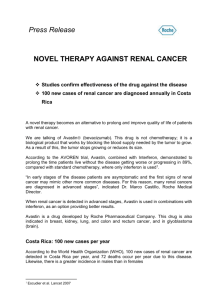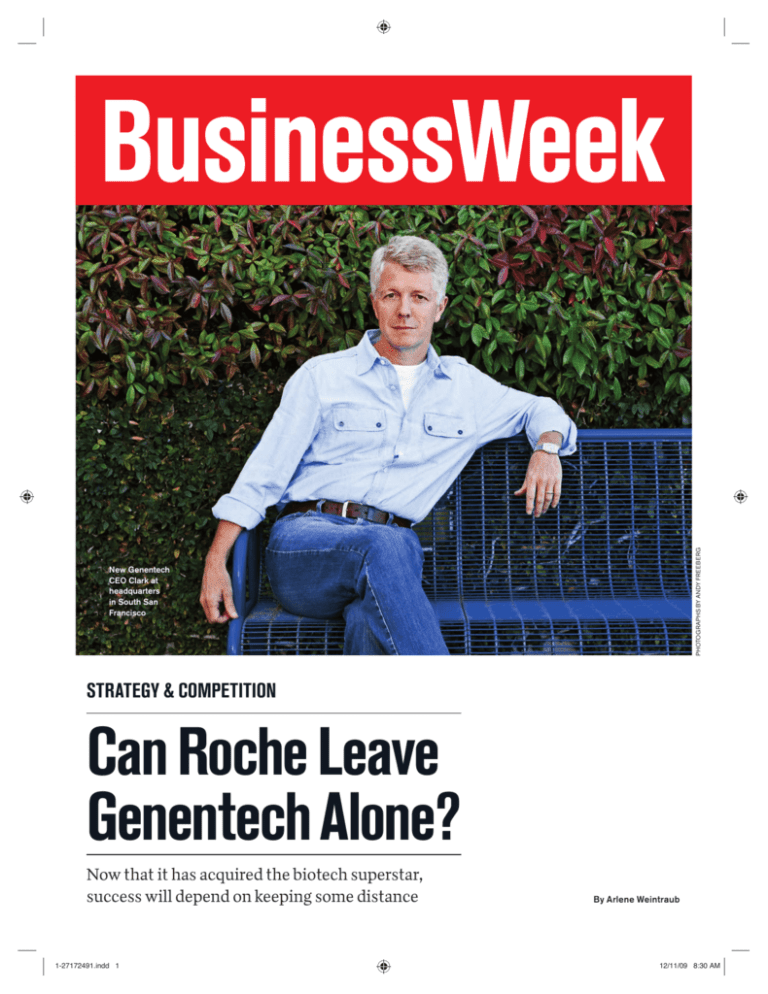
PHOTOGRAPHS BY ANDY FREEBERG
New Genentech
CEO Clark at
headquarters
in South San
Francisco
STRATEGY & COMPETITION
Can Roche Leave
Genentech Alone?
Now that it has acquired the biotech superstar,
success will depend on keeping some distance
1-27172491.indd 1
By Arlene Weintraub
12/11/09 8:30 AM
WHAT’S NEXT
1-27172491.indd 2
management team and suffering little
meddling from its big stakeholder in
Basel. Genentech’s sales doubled, to
$13 billion, in the five years ended in
2008. And the stock advanced more
than 300% in the 10 years leading
up to Roche’s July 2008 bid for the
company. Roche CEO Severin Schwan
says the centerpiece of his integration
strategy is that he will not
impose the Roche culture
or way of doing business
on the South San Francisco biotech unit. “Most
companies think the first
thing you have to do after
an acquisition is streamline everything,” Schwan
says. “I have to tell you,
this kills innovation.”
To keep the ideas flowing from
Genentech’s labs, Roche left in place
almost everything in the research
operation, including its senior leadership team. Genentech’s scientists
will continue to focus on cancer,
immunology, and brain diseases.
“We have a budget and a completely
independent [drug] portfolio that
we manage, irrespective of the rest
of Roche,” says Richard H. Scheller,
a nine-year Genentech veteran who
continues to serve as head of research.
To ensure scientists wouldn’t flee
from what might now seem like a big,
bureaucratic company, Scheller and
his colleagues preserved Genentech’s
university-like culture. The postdoctoral program for fledgling scientists
is intact, as are the Wednesday review
meetings where researchers present
their work to management. And Genentech still throws after-work parties
on Fridays, a tradition that stretches
back to the company’s founding in
1976.
Roche is following a completely
different research path from those of
its rivals, which have been
reshuffling research and
development in a desperate
attempt to jump-start innovation and make research
more efficient. Companies
such as Pfizer and GlaxoSmithKline have set up small
R&D units defined by what
diseases they’re pursuing.
At Pfizer, the changes
Roche’s Soriot
have been disruptive:
worried about
The company said in
fixing what
November it would
wasn’t broken
at Genentech
close six research sites.
Roche, on the other
hand, is keeping its existing research
centers in Basel; Nutley, N.J.; and
South San Francisco as independently
managed sites. And it’s encouraging
scientists in all those places to pursue
a variety of therapeutic targets—even
if their efforts overlap with other
Roche sites. Roche scientists from
around the world will share results,
meeting periodically to decide which
molecules have the best chance of
becoming drugs. “You need different
approaches and cultures and ways of
pursuing ideas,” Schwan says.
DRUG COMPANY MERGERS BY THE NUMBERS
Roche’s Genentech deal helps it
compete with newly merged rivals...
80
...and makes it a leader
in biotechnology
PERCENTAGE OF SALES FROM
BIOTECH DRUGS AND VACCINES *
BILLIONS OF DOLLARS
2010 ESTIMATED SALES AND EARNINGS
SALES
EARNNGS
60
60.2%
ROCHE/
GENENTECH
40
PFIZER/
WYETH
8.7%
20
MERCK/
SCHERINGPLOUGH
18.5%
0
ROCHE/
GENENTECH
PFIZER/
WYETH
Data: Bloomberg, IMS Health
MERCK/
SCHERINGPLOUGH
*Estimates based on product sales for the 12 months
ended June 2009. Roche does not sell vaccines.
CHART BY LAUREL DAUNIS/ALLEN/BW
Pascal Soriot, a senior executive with
Roche, says he was wracked with
anxiety while boarding a plane from
Basel, Switzerland, to San Francisco
last March. The Swiss pharmaceutical
giant had just acquired its longtime
drug development partner, Genentech, and Soriot was on his way to
meet the company’s CEO, Arthur D.
Levinson, credited with building one
of the world’s most effective pipeline for cancer drugs. The Genentech
products that Roche sold overseas,
including Herceptin for breast cancer
and Avastin for colon cancer, accounted for 40% of Roche’s $42.3 billion in
revenue last year. Soriot was awed—
and worried. “The first question I
asked Art was, ‘How do we keep the
Genentech spirit alive forever?’ ” he
recalls.
Several of the world’s top pharmaceutical companies are spending the
final weeks of 2009 digesting some
of the biggest acquisitions in their
history. Pfizer just closed its $68 billion merger with Wyeth, and Merck
sewed up its $41 billion purchase of
Schering-Plough. Roche’s deal was
different: It paid $47 billion to acquire
the 44% of Genentech it didn’t already
own, essentially bringing its most productive unit in-house when the deal
closed on Mar. 26.
What all these companies have in
common is they must prove to investors and patients that they’ve learned
from past megadeals, which typically
generated short-term cost savings
but few exciting drugs. “If you look
at mergers in the pharmaceutical
industry, I don’t think we have a long
history of successes,” concedes Ian T.
Clark, a Genentech veteran who will
become the unit’s CEO starting in
January and is serving on the integration team. “Roche knew that the cradle
of innovation was the research site
at Genentech and that it needed to
be handled carefully and distinctly.”
Investors expect Roche to get it right:
The company’s American depositary
receipts have climbed 12% this year,
to 41.
For nearly 20 years, Roche executives said that Genentech succeeded
because it operated at arm’s length,
maintaining its own shareholders and
12/11/09 8:30 AM
WHAT’S NEXT
The merger will also allow Roche
and Genentech to work together on
an elusive goal they share: so-called
personalized medicine. Roche leads
in this area because it is a pioneer in
“diagnostics,” or technologies doctors
use to determine which patients will
respond best to which drugs. Genentech pioneered this approach with
Herceptin, a breast cancer drug that
comes with a genetic test to pinpoint
appropriate patients. When they
were separate, Genentech and Roche
rarely tried to co-develop diagnostics,
because it took too long to work out
patent rights and other legal logistics.
“Now there’s no intellectual-property
discussion, there’s no negotiation—
we’re the same!” Scheller says. “You
wouldn’t believe how much easier
it is.” Genentech has already set up
partnerships with Ventana Medical
Systems, a U.S. diagnostics company
Roche acquired in 2008.
A DIFFERENT COURSE
While Pfizer and Merck have been
laying off scientists, Roche has let go
fewer than 1,000 employees, almost
all of whom worked in service functions. Analysts predict the company
will continue spending more than
20% of sales on R&D, outpacing the
15% or so that most large drug companies spend. Schwan predicts the
merger will eliminate $800 million in
costs next year, nowhere near the $3
billion to $4 billion in savings Merck
and Pfizer expect from their deals.
But Roche could turn in doubledigit earnings growth because it is so
heavily concentrated in high-margin
products such as biotech drugs (table). “It has a defensible base business
that makes it different,” says Jeffrey
Holford, an analyst for Jefferies Group
in London. He expects Roche to chart
compounded annual earnings growth
of 13% through 2013, helped by tax
efficiencies gained from owning Genentech outright.
Schwan is so determined to leverage Genentech’s reputation that he
rebranded all the drugs Roche sells in
the U.S. as Genentech products. Even
nonbiotech names such as Valium and
Tamiflu now carry the name Genentech. Embracing an acquiree’s identity is a rare move in the drug industry,
but it sends a powerful message to
employees, customers, and investors. “If you’re buying an organization because you feel it’s an extremely
productive innovation engine with a
precious culture, you keep the name,”
says Peter Tollman, a vice-president
in Boston Consulting Group’s healthcare practice.
Genentech’s former CEO Levinson
isn’t ready to call Roche’s strategy a
success quite yet, but he’s encouraged
that none of Genentech’s top scientists have left. “I was apprehensive
because our cultures are not perfectly
concordant,” says Levinson, who is
now chairman of the unit and will join
Roche’s board next year. In the end,
he adds, he found that “Roche has a
deep appreciation for protecting the
science.” ^
Posted from BusinessWeek, December 7, 2009, copyright by Bloomberg L.P. with all rights reserved.
This reprint implies no endorsement, either tacit or expressed, of any company, product, service or investment opportunity.
#1-27172491 Managed by The YGS Group, 717.505.9701. For more information visit www.theYGSgroup.com/reprints.
1-27172491.indd 3
12/11/09 8:30 AM

